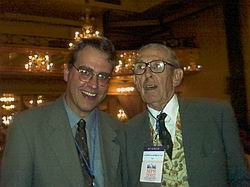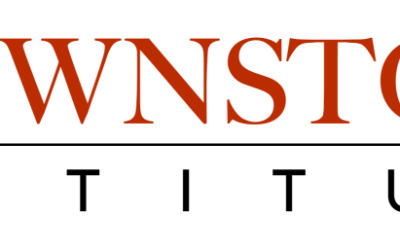Lord Harris of High Cross, who died on Thursday at the age of 81, played a decisive role in the free-market counter-revolution of the 1980s. The Institute of Economic Affairs, of which Ralph Harris became the founding director in 1957, prepared the ground for what subsequently came to be called Thatcherism, after Margaret (now Baroness) Thatcher, Britain’s Conservative prime minister between 1979 and 1990. Yet Harris was never a traditional conservative. The creed to which he held throughout his influential career was 19th-century classical liberalism.
John Blundell, current director of the IEA, said Thursday night: “Ralph Harris was often described as the architect of Thatcherism but he used to tease her that she was an IEA-ite because the IEA had been advocating market economics for 20 years before her time. She replied: ‘Ralph, the cock may crow but it’s the hen that lays the egg.’”
The late Antony Fisher put up the money to establish the IEA in the highly unfavourable intellectual environment of the 1950s. At that time the “Butskellite” consensus – named after the Conservatives’ R. A. Butler and Labour’s Hugh Gaitskell – reigned supreme. Keynesian ideas, public ownership of large parts of industry and the welfare state were nigh-on unchallengeable.
Fisher had, however, been persuaded by the late Friedrich Hayek, the Nobel-laureate proponent of classical liberalism, that the way to overturn the collectivist consensus was through an intellectual counter-attack. The way forward, suggested Hayek, would be through an institution that would publish research aimed at re-establishing the relevance of free-market ideas. That institution, headed by Harris, with the co-operation of the late Arthur Seldon, was to be the IEA.
Harris was the ideal director. After lecturing at St Andrews University in Scotland, already known as a centre of free-market ideas, he became a leader writer on the Glasgow Herald. Under his direction, the IEA was to forge close relationships with sympathetic economists. Of these the most influential, after Hayek himself, was to be Milton Friedman. Other significant influences were the late George Stigler of Chicago University and James Buchanan of the George Mason University in Virginia, one of the founders of the “public choice school”, both winners of the Nobel memorial prize in economics.
The institute’s aim was to argue for the superiority of the free market. The principal instrument used by Harris and Seldon was publication of pamphlets and books. Consistently and controversially, these argued against the prevailing orthodoxies of the 1950s, 1960s and 1970s – against macro¬economic fine-tuning, tolerance of inflation, monetary indiscipline, public ownership of industry, the welfare state, incomes policy and the many other forms that collectivist ideas took at the time.
Conventional wisdom thought the IEA eccentric, at best, and dangerous, at worst. Harris was to have the last laugh. The 1970s tested that conventional wisdom to destruction. The late Keith Joseph, the decisive intellectual influence on Lady Thatcher, started to look for an alternative for a future Conservative government. After her election as leader of the party in 1975, she was to be the standard-bearer of these ideas in practical politics. Although Joseph and Lady Thatcher were to found the Centre for Policy Studies, to hone their ideas, it was on the work of the IEA that they built.
The 1980s and 1990s were the apogee of the counter-revolution in ideas and in policy. In the UK, monetarism replaced Keynesianism, privatisation replaced public ownership, deregulation of the labour market replaced the power of trade unions. Similar changes occurred, in different political circumstances, under Ronald Reagan in the US. The tide of liberalisation spread across the world into unlikely places – China, India and, most remarkably, into the Soviet empire.
The IEA played an active role in this wider revolution. It forged close relations with similarly inclined institutions in the US. Thus Edwin Fuelner, president of the Heritage Foundation in the US, said: “Ralph defined for so many of us the importance of the world of ideas and and showed there was an alternative to the nanny state. He showed that choice was a noble aspiration that brought out the best in men and women in a free society.”
The IEA also played an active role in founding similar think-tanks around the world. Today, there exists a network of more than 100 similar institutions in almost 80 countries. In this way, it has been able to spread classical liberal ideas across the world. The IEA also spawned think-tanks at home: Civitas, which focuses on social policy, the International Policy Network, which concentrates on economic development and global environmental policy, and the Social Affairs Unit are just three of these.
Harris became an active opponent of the European Union. Not long after ceasing to be director of the IEA in 1987, he became chairman of the Bruges Group between 1989 and 1991, named after the controversial speech delivered by Lady Thatcher in Bruges on September 20 1988. In this capacity, Harris played a significant part in promoting euroscepticism. This issue was to divide not just the Conservative party but even the IEA, where he remained as founder president.
An enthusiastic pipe-smoker, he was also honorary president of Forest, the UK pro-smoking group, and an active campaigner against increasingly tough restrictions on the freedom to smoke.
Of the success of much of what he argued for over his lifetime there can be no doubt. The intellectual climate in his own country and across the world on the role of free markets is entirely altered. So, too, is the attitude towards the EU of influential people in the UK. It has certainly shifted in a more eurosceptic direction. But his success was also limited: in particular, the IEA achieved little progress in rolling back the welfare state itself, as the new Conservative party of David ¬Cameron, leader of the opposition, demonstrates.
Unfailingly kind and humorous, Harris was a pleasure to know. Even his opponents found it hard to dislike him.
Sir Geoffrey (now Lord) Howe, the former chancellor of the exchequer, who knew Lord Harris from the inception of the IEA, described him as a “sparkling, energetic personality”, adding: ”He was the dynamo and the presentational maestro of the IEA. He made a crucial contribution to the economic liberalisation of Britain.”
In addition to being a successful director of the IEA, Harris was a prolific author. He published a biography of R. A. Butler in 1956 and pamphlets on advertising, choice in welfare, British economic policy, and other subjects. Professor Patrick Minford on Thursday praised Lord Harris’ skills as a “great communicator, able to explain the importance of a free market economy in concrete terms that ordinary people could understand.”
Harris contested parliamentary seats for the Conservatives twice in the 1950s. But politics was not his metier. He was, however, to become legislator in 1979, when Margaret Thatcher raised him to the peerage. His wit and eccentric charm were to make him an adornment of the House of Lords.
Born in London, the son of a tramways inspector, Ralph Harris read economics at Queens College, Cambridge before becoming political education officer for the Tory party in the South East. He married Jose Pauline Jeffrey in 1949. She survives him, as does their daughter. Two sons predeceased him.
1924 – 2006
Economist and founder of the Institute of Economic Affairs.

Picture above: Lord Harris with Frontier President Peter Holle at the 2002 Mont Pelerin Society meeting in London.


